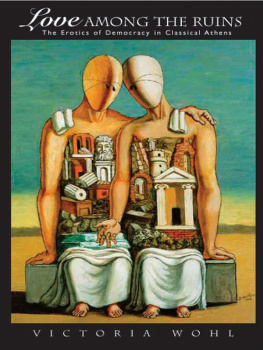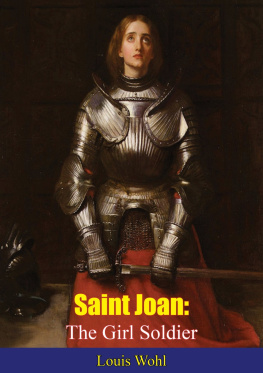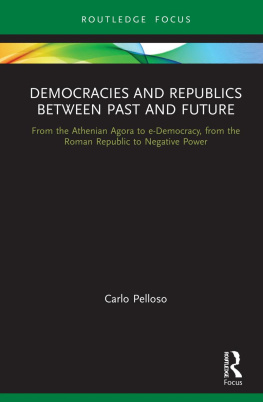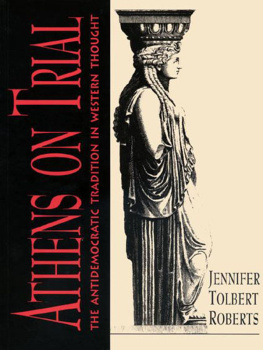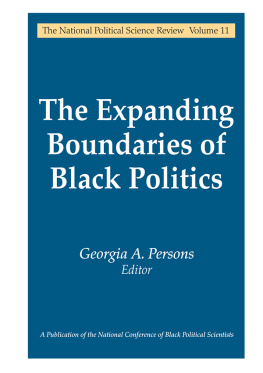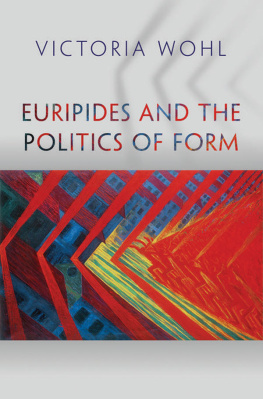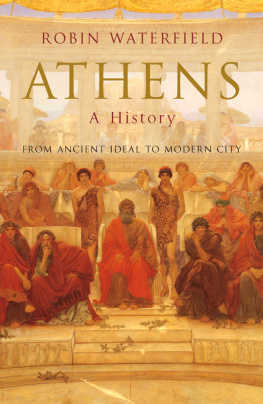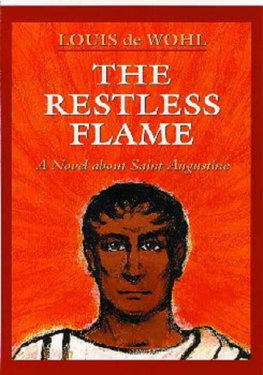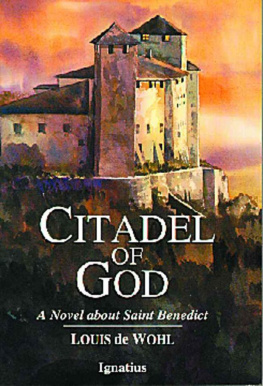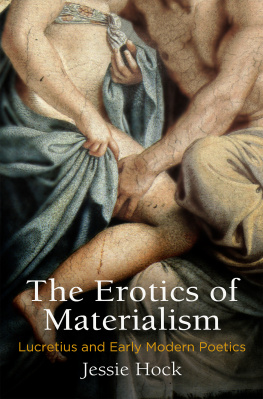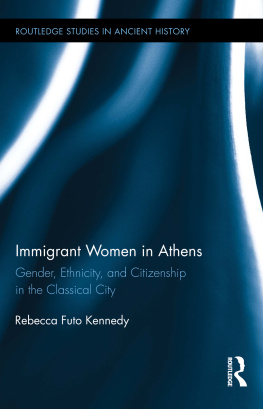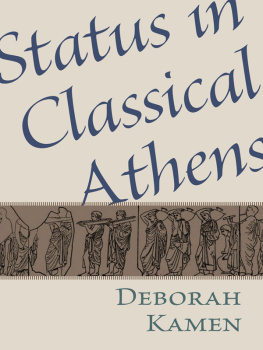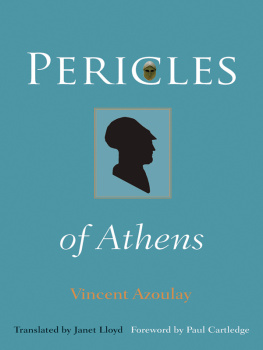Wohl - Love among the Ruins: The Erotics of Democracy in Classical Athens
Here you can read online Wohl - Love among the Ruins: The Erotics of Democracy in Classical Athens full text of the book (entire story) in english for free. Download pdf and epub, get meaning, cover and reviews about this ebook. City: Princeton, year: 2009;2008, publisher: Princeton University Press, genre: Religion. Description of the work, (preface) as well as reviews are available. Best literature library LitArk.com created for fans of good reading and offers a wide selection of genres:
Romance novel
Science fiction
Adventure
Detective
Science
History
Home and family
Prose
Art
Politics
Computer
Non-fiction
Religion
Business
Children
Humor
Choose a favorite category and find really read worthwhile books. Enjoy immersion in the world of imagination, feel the emotions of the characters or learn something new for yourself, make an fascinating discovery.
Love among the Ruins: The Erotics of Democracy in Classical Athens: summary, description and annotation
We offer to read an annotation, description, summary or preface (depends on what the author of the book "Love among the Ruins: The Erotics of Democracy in Classical Athens" wrote himself). If you haven't found the necessary information about the book — write in the comments, we will try to find it.
Wohl: author's other books
Who wrote Love among the Ruins: The Erotics of Democracy in Classical Athens? Find out the surname, the name of the author of the book and a list of all author's works by series.
Love among the Ruins: The Erotics of Democracy in Classical Athens — read online for free the complete book (whole text) full work
Below is the text of the book, divided by pages. System saving the place of the last page read, allows you to conveniently read the book "Love among the Ruins: The Erotics of Democracy in Classical Athens" online for free, without having to search again every time where you left off. Put a bookmark, and you can go to the page where you finished reading at any time.
Font size:
Interval:
Bookmark:

Love among the Ruins
Love among the Ruins
THE EROTICS OF DEMOCRACY IN CLASSICAL ATHENS
Victoria Wohl
P R I N C E T O N U N I V E R S I T Y P R E S S
P R I N C E T O N A N D O X F O R D
Copyright 2002 by Princeton University Press
Published by Princeton University Press, 41 William Street,
Princeton, New Jersey 08540
In the United Kingdom: Princeton University Press,
3 Market Place, Woodstock, Oxfordshire OX20 1SY
All Rights Reserved
Library of Congress Cataloging-in-Publication Data
Wohl, Victoria, 1966
Love among the ruins : the erotics of democracy in classical Athens / Victoria Wohl.
p.cm.
Includes bibliographical references and index.
eISBN: 978-1-40082-529-5
1. DemocracyGreeceAthensPsychological aspectsHistory.
2. SexPolitcal aspectsGreeceAthensHistory. 3. Sex role
Political aspectsGreeceAthensHistory. I. Title.
JC75.D36 W64 2002
320.9385dc212002072289
This book has been composed in Sabon
Printed on acid-free paper.
www.pupress.princeton.edu
Printed in the United States of America
13579108642
For Erik
CONTENTS
PREFACE
THE SPIRIT OF Athenian democracy is a familiar topic, but I hope in the course of this book to defamiliarize both of its key terms. The spirit I seek to understand is not the ineffable Geist of the democracy but its psyche or unconscious, its  The phrase spirit of democracy of ten implies a tautological doubling, in which spirit and democracy each means precisely the other: the demos is characterized by its democratic spirit and the democracy by the spirit of its demos. But when the
The phrase spirit of democracy of ten implies a tautological doubling, in which spirit and democracy each means precisely the other: the demos is characterized by its democratic spirit and the democracy by the spirit of its demos. But when the  is understood as the unconscious, the relationship between the two terms becomes more complex, and a new reading of spirit yields a new understanding of Athenian democracy. Behind the well-known facade of Athenian democratic ideology lies a phantasmatic history of longings and terrors, perverse desires and untenable attachments. These fantasies constitute Athenian democracy as we recognize it: they are the psychic scaffolding of Athenss manifest political structure, holding aloft its political ideals and holding together its political relations. They can also, however, disrupt the smooth surface of Athenian ideology, exposing its impossible sutures, its dangerous gaps, and the forced labor of its erection. When they are uncovered, these fantasies show us a democracy often at odds with its own spirit and reveal both terms alike to be less familiar than we may have thought.
is understood as the unconscious, the relationship between the two terms becomes more complex, and a new reading of spirit yields a new understanding of Athenian democracy. Behind the well-known facade of Athenian democratic ideology lies a phantasmatic history of longings and terrors, perverse desires and untenable attachments. These fantasies constitute Athenian democracy as we recognize it: they are the psychic scaffolding of Athenss manifest political structure, holding aloft its political ideals and holding together its political relations. They can also, however, disrupt the smooth surface of Athenian ideology, exposing its impossible sutures, its dangerous gaps, and the forced labor of its erection. When they are uncovered, these fantasies show us a democracy often at odds with its own spirit and reveal both terms alike to be less familiar than we may have thought.
This study of the spirit of democracy is thus an analysis of the democratic psyche. What does it mean, though, to analyze the psyche of the Athenian democracy or of the Athenian demos? The unconscious is a notoriously elusive object, and all the more so when it belongs not to a living individual but to a long-dead community. First, I take demos not as a transcendental subject but as a discursive formation, a compendium of things the Athenians said (and did not say) about themselves as citizens. This figure might lack the commonsense organic unity of a human subject, but as a discourse it does have a certain internal consistency, a logic that governs both its expressions and its repressions. Available to us only through textual representations, this discourse is also itself textual: it is articulated through politically invested tropes and structured by ideologically inflected metaphors and metonymies. Like any discourse, it encompasses not only what it can and does say but also what it cannot sayits unspoken or unspeakable subtextand hence is always marked by certain fundamental incoherences. Those incoherences are the locus of the democratic unconscious, which will appear not as a character within this text but as a distinctive quality of it: the shape of its silences and the inconcinnity of its utterances. Beyond the proclamations of civic pride, beyond the laudations of Athenian egalitarianism and freedom, these qualities define the  psukhe of Athenian democracy.
psukhe of Athenian democracy.
If Athenss political unconscious is a textual unconscious, it is also in a more concrete sense an intertextual unconscious. Thus, although I often pursue the Athenian psyche within the slips and fissures of specific fifth-and fourth-century literary texts, I also maintain that it always exceeds its articulation in any individual text or author. The democratic unconscious is a collective hallucination conjured by an entire discourse: it hovers over (or, better, beneath) our texts. Sometimes we glimpse it within the complexities of a single document; sometimes it emerges in the friction between documents. On the one hand, then, this discursive unconscious can never simply be equated with any given textual representation of it. On the other hand, it can never be recovered as a totality, not only because of the poverty of our sources but also because of the amplitude of the not-said of any discourse. This study, then, is necessarily and admittedly partial.
It may also strike some readers as schizophrenic. Some chapters (2, 3, and 5) move among a number of contemporaneous texts, trying to identify the civic imaginary that each taps into but none individually exhausts. Other chapters (1, 4) focus on a single text and trace in detail the way it works through a specific fantasy and addresses (or fails to address) its imagined ramifications. In these chapters, Thucydides PeloponnesianWar is the privileged case study. This is not because I consider this text a transparent reflection of the Athenian unconscious: while Thucydides account of Athenian history is particularly rich and compelling, his analysis is also in many ways idiosyncratic. But idiosyncrasy occurs within culturally determined bounds, and even as Thucydides offers his unique and often critical views on the democracy, he also (perhaps unwittingly) reproduces its underlying assumptions. We gain an especially clear vantage point on these assumptions by approaching the text from a direction it least expects. Thucydides text does not, I think, ostensibly aim to produce an erotics of politics, but (if my reading is persuasive) it produces one nonetheless; in the process, it inscribes a cultural logic of desire and power that goes beyond its conscious intent. Thucydides PeloponnesianWar is thus simultaneously a text with its own fantasies and desires and also an expression of a broader cultural imaginary that its author reproduces simply by virtue of composing in a particular time and place. These two aspects are hard to unravel, and perhaps it is unnecessary to unravel them: while I point out places where I think the text is being deliberately iconoclastic, I also maintain that such iconoclasm is not external to the discourse it attacks but is in fact an integral part of it. Thus the shift between the two parts of the book is one of perspective, not of object: chapters 1 and 4 take a closeup view of specific textual dynamics that chapters 2, 3, and 5 situate within the larger psychic panorama of fifth-century Athens. I hope by this double approach to uncover both the topography of the Athenian unconscious and a few of its most conspicuous monuments.
Next pageFont size:
Interval:
Bookmark:
Similar books «Love among the Ruins: The Erotics of Democracy in Classical Athens»
Look at similar books to Love among the Ruins: The Erotics of Democracy in Classical Athens. We have selected literature similar in name and meaning in the hope of providing readers with more options to find new, interesting, not yet read works.
Discussion, reviews of the book Love among the Ruins: The Erotics of Democracy in Classical Athens and just readers' own opinions. Leave your comments, write what you think about the work, its meaning or the main characters. Specify what exactly you liked and what you didn't like, and why you think so.

